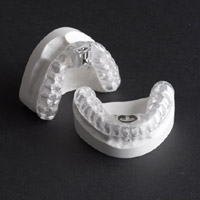Treating Sleep Apnea
The Snoring and Sleep Apnea Dental Treatment Center of Maine supports health care professionals and consumers interested in overcoming sleep apnea and snoring challenges.
Four Ways to Treat Snoring & Obstructive Sleep Apnea
Behavior Modification
There are certain things you can do at home that may help reduce your sleep problems:
- Overweight patients should maintain a weight loss program.
- Discontinue use of sleep medications, alcohol, and tobacco.
- Sleep on your side, not your back or stomach.
- Have a regular sleep schedule and stick to it.
- Use saline nasal spray if necessary for congestion.
- Elevate the head of your bed slightly with books or wooden blocks.
- Create a quiet and dark environment for sleep.
CPAP (Continuous Positive Airway Pressure)
CPAP stands for continuous positive airway pressure. CPAP is a device that consists of a nasal mask, tube, base unit, and head straps. CPAP is considered the gold standard of treatments for sleep apnea. However, when patient compliance is considered, the success rates drop significantly. Many people give up on CPAP because they find it extremely uncomfortable. If you are only able to tolerate CPAP for part of the night, you may be better off with an oral appliance.
Oral Appliance Therapy
Updated practice parameters of the American Academy of Sleep Medicine now recommend the use of oral appliances for mild-to-moderate OSA, or for patients with severe OSA who are unable to tolerate CPAP or refuse treatment with CPAP. Oral appliances are a simpler alternative to CPAP for the treatment of OSA. They are often considered by patients to be a more acceptable treatment modality compared to CPAP, as they are more comfortable, quiet, and portable. While the role of oral appliances for the treatment of OSA was unclear in the past, this has changed substantially in recent years.
Dental sleep medicine involves the use of specially fabricated oral appliances to open the airway and is rapidly increasing as the therapy of choice for snoring and OSA patients. Dr. Corwin uses an array of appliances so that he can customize treatment for each patient’s unique needs. Oral appliances are a comfortable and practical alternative to CPAP. Oral appliances are not without side effects, so it is important to have this treatment administered by a dentist with experience in dealing with oral appliances and their side effects.
Surgery
There are a variety of surgical procedures used to try and treat snoring and obstructive sleep apnea. Some involve the removal of the obstructive tissues with a laser or scalpel, while others try to stiffen flabby tissues by scarring. Usually, multiple treatments are needed and relapse is fairly common. One surgery, maxillomandibular advancement surgery, is quite successful, but involves the cutting of the jaw and skull bones and re-positioning them forward. Surgeries today are generally considered the least desirable choice for treatment.
Article printed from Sleep Apnea Maine: http://www.sleepapneamaine.com
URL to article: http://www.sleepapneamaine.com/caring-for-sleep-apnea/treating-sleep-apnea/
Click here to print.
